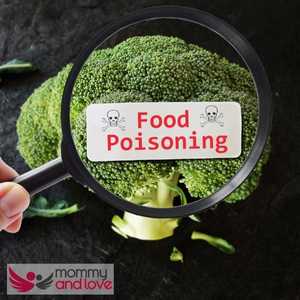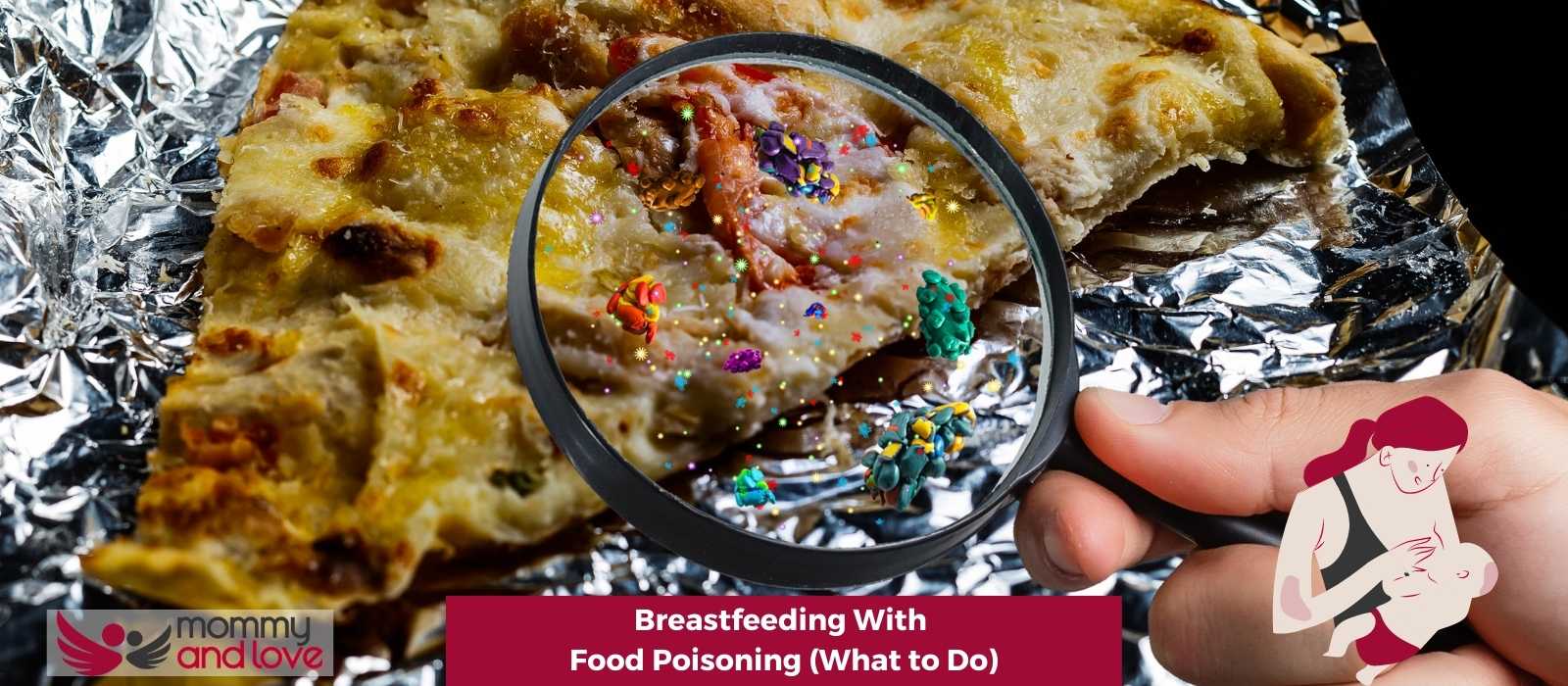Oh, mama. You poor thing, first off we just want to say get well soon! Life is tough enough feeding your newborn without that being thrown in on top! But don’t worry, we’re here to help.
If you find yourself breastfeeding with food poisoning, the best thing to do is nurse through it. You’ll want to drink plenty of fluids – both water and electrolyte drinks like Pedialyte or Gatorade or even coconut water will help – and try to take small sips as often as you can. If you’re feeling up to it, light foods like broth or ice pops can also help. We found coconut water popsicles a godsend when nursing, so always useful to have some in the freezer!
What is food poisoning?

Food poisoning is a general term for illnesses caused by eating contaminated food. Symptoms can range from mild to severe and can last anywhere from a few hours to several days.
What are the most common symptoms of food poisoning?
The most common symptoms of food poisoning include nausea, vomiting, diarrhoea, and stomach cramps. Fever, headache, and body aches are also common. If you are suffering from more severe symptoms seek medical attention, but if you can continue to breastfeed your baby.
How can I prevent food poisoning?
The best way to prevent food poisoning is to practice safe food handling practices. This includes properly washing your hands, keeping food clean and sanitary, and cooking food properly. Be very careful eating raw food like raw oysters and other foods which are more at risk for causing a foodborne illness. Contaminated food is the main cause of food poisoning, causing you to vomit and become dehydrated.
Can You Breastfeed With Food Poisoning?
Yes, you can continue to breastfeed with food poisoning. In fact, it’s important to continue breastfeeding if you have food poisoning, as it will help keep your baby hydrated. Breastfeeding also provides your baby with crucial nutrients and antibodies that can help fight off the infection.
If you are able, there is no reason to stop breastfeeding whilst you have food poisoning. However, if you feel you have to stop breastfeeding, especially if you have extreme food poisoning symptoms, then don’t panic a few days of the baby on formula is not the end of the world. Once you are better your breast milk supply and milk production should return to normal.
Can Food Poisoning Be Passed Through Breast Milk?

No, the CDC has confirmed that is virtually impossible for your baby to get food poisoning from breastfeeding mothers. This is because most of the organisms or bacteria which might cause food poisoning do not transmit in breastmilk.
The bacteria which causes the food poisoning stays in the mom’s gut or intestinal tract.
Salmonella, in very rare cases, could possibly get into the mother’s bloodstream and milk but it is not likely and if it did happen, then the antibodies in the breastmilk would help protect your baby.
So, as long as you are feeling up to it, continue breastfeeding even if you have food poisoning. Continue to breastfeed as often as possible and drink plenty of fluids to keep yourself hydrated. If your milk supply dips a bit due to dehydration, don’t worry – it will likely come back once you’re feeling better. And if it doesn’t, you can always supplement with formula until your milk supply is back to normal.
Does milk supply decrease with food poisoning sick?
Yes, it’s very possible especially if you are dehydrated. If you are feeling sick and not able to eat or drink much, your milk supply may decrease. However, once you are better your milk supply should return to normal levels.
It’s vital when you have food poisoning to keep yourself hydrated. Drink plenty of fluids, both water and electrolyte drinks, as well as light foods like broth or ice pops. You may also need to take oral rehydration salts if you have severe symptoms. It is safe for nursing mothers to take rehydration salts and its vital if you are nursing to keep your fluid intake up.
Food You Should Eat While Recovering From Food Poisoning
Once you have been diagnosed with food poisoning, your doctor will most likely tell you to avoid certain foods. This is because certain foods can slow down the healing process and make you feel worse. Its generally recommended to follow the brat diet (bananas, rice, applesauce and toast). Here are some of the best foods to eat while recovering from food poisoning:
1. Soups and broths: Broths are a great way to get fluids and nutrients into your system. Soups are also a good way to get carbohydrates and proteins.
2. Bananas: Bananas are a great source of potassium, which can help with nausea and vomiting.
3. Toast: Toast is a bland food that is easy to digest. It is also a good source of carbohydrates.
4. Ginger: Ginger can help with nausea and vomiting. You can drink ginger tea, eat ginger candy, or take ginger supplements.
5. Rice: Rice is a bland food that is easy to digest. It is also a good source of carbohydrates.
6. Chicken: Chicken is a high-protein food that is easy to digest.
7. Apple sauce: Apple sauce is a good source of carbohydrates and can help with nausea and vomiting.
8. Yogurt: Yogurt is a good source of probiotics, which can help with digestion. It is also a good source of protein and calcium.
9. Popsicles: Popsicles are a great way to get fluids and nutrients into your system.
10. Water: Water is the most important thing you can drink while recovering from food poisoning. Drink plenty of water to stay hydrated.
These are just a few of the best foods to eat while recovering from food poisoning.
Foods to avoid during food poisoning
1. Dairy products: Dairy products can cause diarrhea and are difficult to digest.
2. Fried foods: Fried foods can aggravate your stomach and slow down the healing process.
3. Spicy foods: Spicy foods can cause nausea and vomiting.
4. Fatty foods: Fatty foods can also cause nausea and vomiting.
5. Raw fruits and vegetables: Raw fruits and vegetables can cause diarrhea and are difficult to digest.
6. Coffee: Coffee can aggravate your stomach and make you feel worse.
7. Alcohol: Alcohol can also aggravate your stomach and make you feel worse.
8. Sugar: Sugar can aggravate your stomach and slow down the healing process.
9. Carbonated drinks: Carbonated drinks can cause nausea and vomiting.
10. Smoking: Smoking can irritate your stomach and slow down the healing process.
Food poisoning can be a very unpleasant experience. Following these tips will help you recover quickly and get back to feeling like yourself again.
Does bacteria transfer through breast milk?
Yes, recent research indicated that bacteria may transfer from a mother’s milk supply to her baby’s intestines and usually this is a good thing for babies. However, it’s very rare for bacterial infections to pass through breast milk to babies so if you do have food poisoning, it will not pass through your breastmilk.
The World health organization states that harmful bacteria should not pass through and it’s more important for moms to breastfeed their babies if they can.
Can I take Pepto-Bismol while breastfeeding?
No, it is currently not recommended for breastfeeding mothers to take pepto-bismal. According to the studies, it is not safe to consume Pepto-Bismol during nursing. While there is no solid proof that bismuth subsalicylate travels via breast milk to the newborn, other salicylates do. As a result, the majority of authoritative organizations advise against using salicylates while nursing.
You should check all medications for diarrhea or food poisoning and avoid any with bismuth subsalicylate compounds. Seek advice from a medical professional or a healthcare professional if you are unsure about what is safe for lactating mothers.
Take Away on Food Poisoning While Breastfeeding
For nursing mothers, it’s vital that you are treating food poisoning whilst always maintaining your fluid intake. If you just have a stomach upset from spicy food then just follow the BRAT diet (bananas, rice, applesauce and toast) until you feel better.
If you are suffering from extreme symptoms then breastfeeding moms should seek medical attention, your doctor may wish to prescribe antibiotics or in the worst-case scenario inform disease control about an e-coli or other harmful viruses outbreak!
Even then it is safe to breastfeed and you should continue if you can! Keep drinking water or coconut water at regular intervals, take any medication or treatment prescribed and seek as much rest as you can!
Food poisoning while breastfeeding is not nice and we wish you luck!

This article was written by Sandra Baker – full time writer and the mother of four amazing kids (including twins!)
She’s also a breastfeeding counselor and has spent years helping new parents learn how to care for their children. When she’s not writing or caring for her children, Sandra likes to spend time reading and taking walks with her husband.




